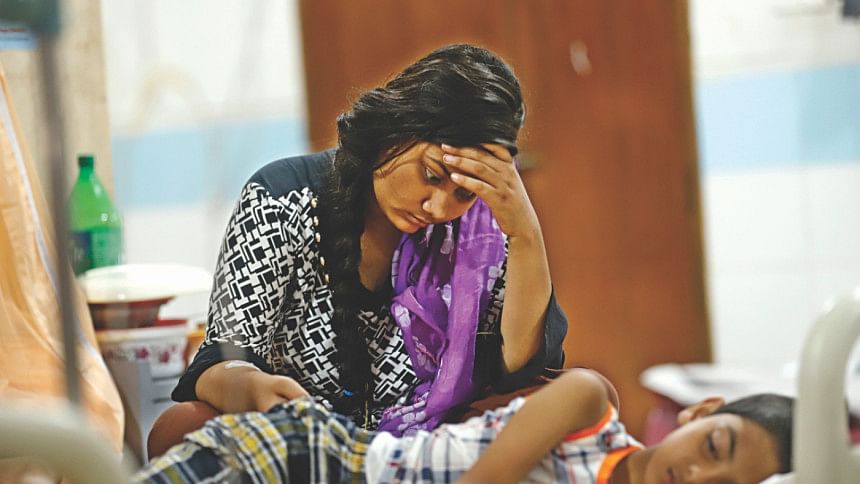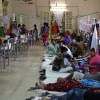Dengue: All you need to know

As dengue fever is turning into a severe health crisis across the country, it is important that you know about the disease, how it spreads, and what you should do to minimise the risk of the disease.
What is Dengue?
Dengue fever is a painful, debilitating mosquito-borne disease. Aedes aegytpi, a species of mosquito, is the carrier of any one of the four closely related dengue virus serotypes -- DEN 1, DEN 2, DEN 3 and DEN 4.
Symptoms appear between 3 to 14 days (on average 4 to 7 days) after the infective bite.
Dengue affects infants, young children and adults.
Symptoms of Dengue fever
Symptoms of dengue fever may include high fever, severe headaches, pain behind the eyes, severe joint and muscle pain, fatigue, nausea, vomiting, skin rash (usually 2 to 5 days after the onset of fever), and mild bleeding (such a nose bleed, bleeding gums, or easy bruising).
General advice for patients on home-care
-- Even if you are positive (+) for dengue NS1 Antigen test, you may not need immediate hospitalisation.
-- Negative (-) NS1 test does not exclude dengue illness.
-- Home care should be always guided by a qualified doctor.
-- Hospital admissions will be determined by platelet count of the latest complete blood count (CBC).
Platelets in our blood influence the coagulation process and are responsible for preventing bleeding. For this reason, it is recommended that you keep them within the advisable parameters.
Dengue fever can lower the platelet count and could turn fatal.
If the platelet count is significantly low due to dengue fever, one must consult a specialist doctor as early as possible and follow his instructions.
Medicine Consultant of AMZ Hospital Dr Mohammad Sayem advised to take enough fluid and complete bed rest for dengue patients. He also suggested monitoring Blood Pressure (BP) and conduct CBC test regularly.
"The NS1 test should be taken on the very first day of the fever striking. It holds relevance after 24 hours also, but ideally should be taken within 24 hours," he said.
Fluid management for Dengue patients
-- Fluids should include not only water but also certain electrolyte solutions such as fruit juice, papaya juice, green coconut water, chicken soup, yogurt, etc.
-- Drink enough fluids to maintain a normal urine output.
-- If the body weight is between 30 to 50 kilogrammes, take fluids double the weight in millilitres (ml) per hour, according to medicine specialist doctor's opinion.
When and how often should the CBC be repeated?
-- Do the CBC in 8-12 hours intervals as recommended by your doctor.
-- Do not delay showing the report to your doctor (at least within 3 hours) to get medical advice.
-- If the platelet count has reached a low value nearing 100,000/ml, see your doctor immediately.
-- When you see the doctor, bring all your blood investigation reports done during this fever episode.
Advises for proper home-care
Physical Rest
-- Physical rest is highly recommended.
-- Staying at home without exerting yourself to any stress is ideal.
-- Consume sufficient fluids to stay hydrated and maintain the body's electrolyte balance.
Fever control
-- Use Paracetamol (acetaminophen) only.
-- Follow your doctor's instructions on the dose of
-- Use tepid sponging to bring down the fever in between the Paracetamol dosing. Soak a clean towel in moderately warm water, then squeeze the excess water away and wipe the body to reduce fever.
When to get alarmed
The symptoms may develop into serious problems including dengue hemorrhagic fever, a rare complication characterised by high fever, damage to lymph and blood vessels, bleeding from the nose and gums, enlargement of the liver, and failure of the circulatory system.
Such symptoms may progress to massive bleeding, shock, and death. This is called dengue shock syndrome (DSS).
People with weakened immune systems, as well as those with a second or subsequent dengue infection, are often at greater risk for developing dengue hemorrhagic fever.

 For all latest news, follow The Daily Star's Google News channel.
For all latest news, follow The Daily Star's Google News channel. 









Comments